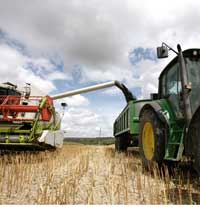Crop Watch: Rain’s a welcome relief but beware pest increase

There is nationwide relief as rain finally falls on most regions, but now is the time to be wary against all the pests that it brings, advise Farmers Weekly’s Crop Watch agronomists this week.
Phoma, slugs and a second wave of cereal volunteers must all be carefully monitored over the coming weeks with the returning moisture.
In Suffolk, the rain was expected to save struggling rape and cereal crops, while there had been limited cases of phoma lesions, said Prime Agriculture agronomist Marion Self.
“Very few phoma lesions have been seen. Continue to monitor crops and treat once a threshold of 10% plants infected is reached. This season, this is likely to be from the third/fourth week of October,” she said.
Slugs, too, will now become more prevalent with the onset of rain.
“It’s worth re-iterating that when soils become moist, the threat of slugs will quickly re-occur. Be vigilant and set bait traps, paying particular attention to backward or struggling crops,” she added.
In the west, despite a lack of rain, there had been enough moisture to prevent hindrance to cultivating the new crops, said Matford Arable agronomist Neil Potts.
“There has been sufficient moisture in the seed-beds to allow germination and the rape crops have emerged with little or no slug activity.”
However, he also warned farmers need to be watchful of the expected problems caused by the rain.
“Cereal volunteers will need to be removed quickly. There is concern that a further flush will appear after we have rain. Thoughts will soon turn to early phoma control. We will be monitoring the phoma forecasts with interest,” he added.
In the north, operations were continuing relatively smoothly, with favourable conditions enabling the application of cereal herbicides, while the recent rain had solved the dry seed-bed problems, reported McCreath, Simpson & Prentice agronomist David Cairns.
“Drilling is progressing very rapidly in this area and a lot of growers are anticipating completion by the end of the week. Benign conditions have allowed us to progress with cereal herbicide applications as planned,” he said.
“Slug pressure is very low and metaldehyde use is at the lowest I have seen. After moisture, it will be interesting to see what traps show this week!” he added.
While parts of the south had serious problems with the lack of rain, on balance the situation was a positive one, said Chichester Crop Consultancy agronomist Tod Hunnisett.
“The rain has just started after what has been for some a fairly serious dry spell. East Kent resembles the African bush in the dry season, but for the rest of my patch, I’m not complaining. To have drilling finished by the end of the first week in October is a nice problem to have,” he said.
Click below for the full report from each region:
Crop Watch North – David Cairns

